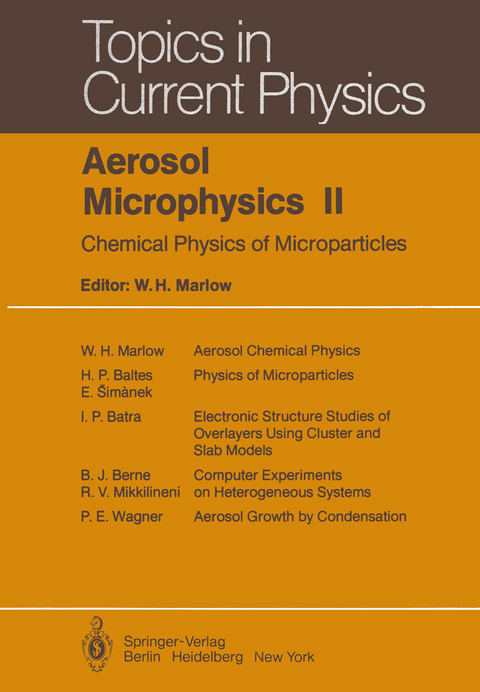
Aerosol Microphysics II
Springer Berlin (Verlag)
978-3-642-81807-3 (ISBN)
1. Aerosol Chemical Physics.- 1.1 Aerosol Microphysics.- 1.2 Chemical Physics of Microparticles.- References.- 2. Physics of Microparticles.- 2.1 Introductory Remarks.- 2.2 Perfect Gases in Finite Boxes of Regular Shape.- 2.3 Optical Phonons in Dielectric Microparticles.- 2.4 Electronic Heat Capacity and Magnetic Susceptibility of Metallic Microparticles.- 2.5 Electromagnetic Properties of Metallic Microparticles.- 2.6 Superconducting Properties.- References.- 3. Electronic Structure Studies of Overlayers Using Cluster and Slab Models.- 3.1 Theoretical Background.- 3.2 ETB-x? Method.- 3.3 Oxygen Chemisorption on Aluminum.- Appendix 3.A.- Appendix 3.B.- Appendix 3.C.- Appendix 3.D.- References.- 4. Computer Experiments on Heterogeneous Systems.- 4.1 Methodology.- 4.2 Computer Simulation of Planar Interfaces in a Lennard-Jones Fluid.- 4.3 Computer Simulation of Idealized Interfaces.- 4.4 Conclusion.- References.- 5. Aerosol Growth by Condensation.- 5.1 Statement of the Problem.- 5.2 Quasistationary Fluxes to a Single Droplet in the Continuum Regime.- 5.3 Quasistationary Fluxes to a Single Droplet in the Transition Regime.- 5.4 Quasistationary Droplet Growth and Evaporation.- 5.5 Experimental Results.- 5.6 Comparison of Numerical Growth Calculations with Recent Expansion Chamber Experiments.- 5.7 Conclusions and Outlook.- References.- Additional References with Titles.
| Erscheint lt. Verlag | 14.12.2011 |
|---|---|
| Reihe/Serie | Topics in Current Physics |
| Co-Autor | H.P. Baltes, I.P. Batra, B.J. Berne, W.H. Marlow, R.V. Mikkilineni, E. Simanek, P.E. Wagner |
| Zusatzinfo | XI, 189 p. |
| Verlagsort | Berlin |
| Sprache | englisch |
| Maße | 170 x 244 mm |
| Gewicht | 368 g |
| Themenwelt | Naturwissenschaften ► Biologie ► Ökologie / Naturschutz |
| Naturwissenschaften ► Chemie ► Physikalische Chemie | |
| Naturwissenschaften ► Geowissenschaften ► Geophysik | |
| Schlagworte | Absorption • Aerosol • air pollution and air quality • chemical physics • Development • Dispersion • Evolution • Fields • metals • Microphysics • NMR • particles • Physics • Sorption • Structure • thermodynamics |
| ISBN-10 | 3-642-81807-2 / 3642818072 |
| ISBN-13 | 978-3-642-81807-3 / 9783642818073 |
| Zustand | Neuware |
| Haben Sie eine Frage zum Produkt? |
aus dem Bereich


